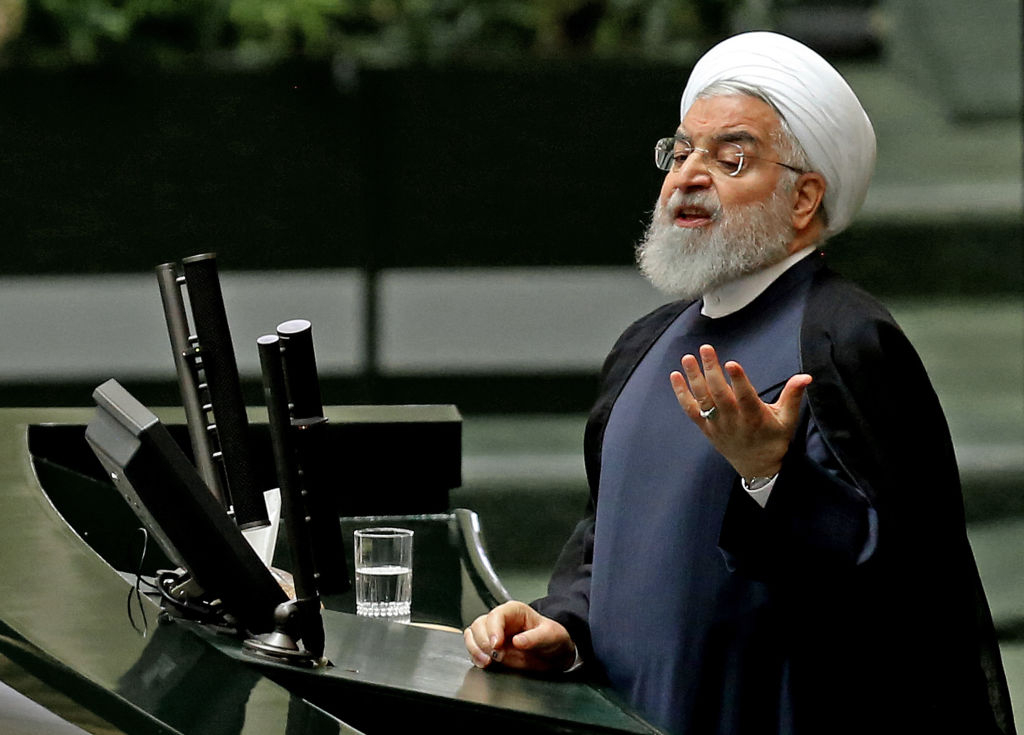 During Iranian President Hassan Rouhani's tenure, thousands of people were executed, including women and children. Pictured: Iranian President Hassan Rouhani. (Photo by Atta Kenare/AFP via Getty Images) |
Iranian President Hassan Rouhani has long been labeled in the West a "moderate" or "diplomatic sheikh" who will change the Iranian regime for the better. The Obama administration reached a deal with the Rouhani's administration and lifted sanctions against the Iranian regime; and now the Biden administration is forging ahead to revive former President Barack Obama's nuclear deal with Rouhani before he leaves office.
Here, for perusal, are the eight-years of records of the so-called moderate President of Iran.
In his first term of presidency, beginning in 2015, Rouhani sealed the nuclear deal -- which, incidentally, Iran never signed -- with the Obama administration. As a result of the deal, both the United Nations' four rounds of sanctions and US sanctions against the Iran's regime were swiftly lifted and the ruling mullahs joined the global financial system. Billions of dollars flew into the regime's treasury.
The beneficiaries of having sanctions lifted were not, however, the ordinary people of Iran. Instead, the regime's officials, those connected to them, the Supreme Leader, Ayatollah Ali Khamenei, Iran's Islamic Revolutionary Guard Corps (IRGC), its elite branch called the Quds Force, and Iran's militia and terror groups across the Middle East profited from the Obama nuclear deal.
Under Rouhani's rule, in fact, the ordinary people's living standards in Iran kept deteriorating. The country's rising inflation reached a level witnessed in Iran only during World War I. Last month, an Iranian official, Ehsan Khandouzi, acknowledged on his Twitter account:
"Recently, the 75-year-old record of inflation was broken in Iran; If [sic] this is not happening then, the Central Bank should publish the February report. Iran only has seen inflation over 50 percent in the years of occupation (World War I)."
When it came to Rouhani's promises of providing greater political freedom and improving human rights, Iran's crackdown on free speech and its levels of oppression continued to rise under his watch. During the widespread protests of 2017 and 2019, the regime brutally suppressed the desperate levels of political unrest.
Rouhani's administration allowed one of the bloodiest crackdowns on protesters: more than 1,500 individuals were killed, many were arrested and tortured, and some high profile figures such as the champion wrestler Navid Afkari and dissident journalist Rouhollah Zam were mercilessly executed.
Under Rouhani's watch, systematic persecution of religious and ethnic minorities, including the Kurds, Sunnis and Christians also escalated .
During Rouhani's tenure, thousands of people were executed, including women and children. In its 2019 global review of the death penalty, Amnesty International stated: "Iran retained its place as the world's second-most prolific executioner after China." The Human Rights Watch "World Report 2021" stated that the Tehran regime is still one of the leading executioners in the world. In total, according to official estimates of the Iranian regime, more than 4,000 people were executed in Rouahni's two-term presidency: an average of 10 executions a week for eight years. To execute political prisoners, the regime's judiciary accuses defendants of vaguely defined charges labeled as "national security crimes," which include "moharebeh" (enmity against God), "ifsad fil arz" (sowing corruption on Earth), and "baghi" (armed rebellion).
Under Rouhani's rule, Iran's Sharia courts system denied defendants access to legal counsel and a fair trial. Lack of due process, forced confessions and physical or psychological torture were prominent. As the Human Rights Watch report noted:
"Iranian courts, and particularly revolutionary courts, regularly fall far short of providing fair trials and use confessions likely obtained under torture as evidence in court. Authorities have failed to meaningfully investigate numerous allegations of torture against detainees. Authorities routinely restrict detainees' access to legal counsel, particularly during the initial investigation period."
Rouhani's two terms as President taught many Iranians that the idea of moderates in the Iranian regime is laughable and a myth. Many chants became popular in Iran for the first time, such as "Reformist, hardliner, the game is now over", "Death to Rouhani," "Shame on you Khamenei, step down from power," and "Death to the Islamic Republic."
The so-called moderate President of Iran, Rouhani is only loyal to Khamenei, not to the people of Iran. Rouhani famously said, following the establishment of the Islamic Republic:
"If the revolution remains within the country it will be destroyed... We must export our revolution to Iraq, to Kuwait, to Afghanistan and to all Muslim countries and to all the oppressed countries."
The Biden administration must not lift sanctions against the Iranian regime and should immediately halt all negotiations with Rouhani administration. It has presided over unspeakable human rights violations; record-setting executions of men, women and children; suppression of Christians and other minorities, and a brutal crackdown on its population. If a country does not treat its own people well, why would it treat its neighbors any better?
Dr. Majid Rafizadeh is a business strategist and advisor, Harvard-educated scholar, political scientist, board member of Harvard International Review, and president of the International American Council on the Middle East. He has authored several books on Islam and US foreign policy. He can be reached at Dr.Rafizadeh@Post.Harvard.Edu


